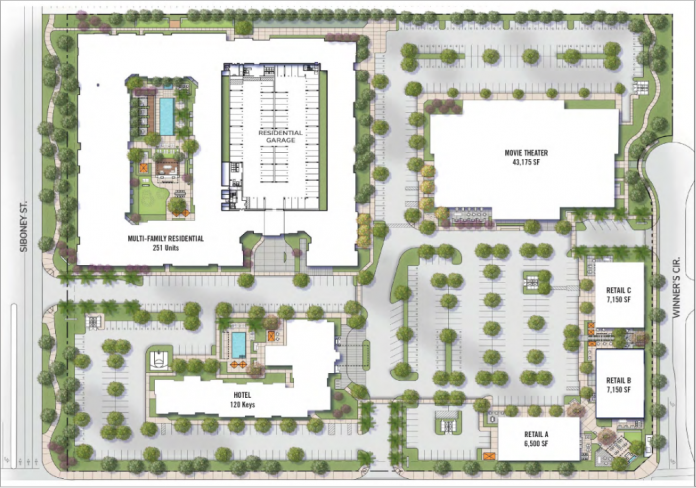The city council of Cypress voted 3-2 this week to allow Shea Properties to purchase a 13.3-acre parcel on Katella Avenue to develop a mixed-use City Center project.
In addition, the council voted 3-2 to award Shea a developer refund of $1.47 million for approximately 25% of the amenities they have planned to bring to the project.
Mayor Rob Johnson, council members Jon Peat and Paulo Morales voted for both motions to allow the go-ahead, while Mayor Pro-tem Mariellen Yarc and council member Stacy Berry voted against both motions.
The project will now include 251 apartments, a 120-unit hotel, 64,000 square feet of retail business space and will be anchored by a grocery store or a theater.
Trying to assuage cries of “bait and switch,” Kevin McCook, director of Acquisitions and Development for Shea Properties, insisted that the potential of a “grocery store” has always been discussed as an alternative to a theater.
Council member Paulo Morales asked city staff to confirm that the potential of a grocery store was earlier discussed in and was in fact, included in the documents approved in November of 2019 to asllow negotiations with Shea to continue.
To be sure, however, there were expressions of support and opposition for the project during a public hearing held before the vote.
Millennials looking for “better housing solutions” and citizens like former mayor and businessman Tim Keenan, who said the City Center development will be “a great project for the city” were supportive, while others suggested ‘bait and switch’ tactics and that a pandemic was not the time to move forward.
Yarc and Berry remained unconvinced, however, that Shea’s proposal was right for the city.
Yarc told McCook the city “has already had a bad experience with your company,” and that she found it wanting to now have a grocery store seemingly take pre-eminence over a theater. “We’ve already got three of them,” said Yarc, referring to grocery stores. “I’m getting a lot of bad vibes,” she said.
Yarc said the potential of a movie theater was the “most exciting thing about the project.”
The mayor pro-tem suggested that she and others had supported the project initially because it was bringing entertainment venues to Cypress. “We have nothing,” she said.
Asked by Yarc what Shea could substitute into its place if Shea decides not to install a movie theater, Director of Development Doug Dancs said there would be “more than 100” allowable uses available under the ordinance the council was being asked to approve.
Flexibility is key to a project like this, said McCook, adding that he was aware conditions have changed since the onset of the pandemic.
McCook even suggested some residents had expressed a preference for grocery stores during a 2019 public meeting on the project.
Nevertheless, he said a movie theater was still the project’s priority.
Berry said the pandemic is exactly why the city should not be handing over its marquis parcel for development. “There are so many unknowns,” she said.
“Our world has changed quite a bit since the pandemic,” said Berry, who questioned project timing. “Is this even the time to be moving forward?
“There’s a lot of fear out there and people’s behavior may change so I’m not sure this is even the right time to go down this path with a set project,” said Berry.
McCook said, in his opinion, the timing is indeed right for project. Given a 10-year window to develop the project, McCook said it will be more than a year before construction begins. He said restaurants in his other developments are doing very well and have seemingly expressed strong demand since the economy has reopened.
“This seems like a very good timeframe to move this project forward,” said McCook, noting that it won’t be completed until 2024 at the earliest. Overall, he said, the Cypress City Center project will create 352 jobs and produce more than $44 million for the city over the next 30 years.
City Manager Peter Grant said most of the economic benefit to the city will come from transient taxes paid by guests of the proposed hotel, a Hilton Homewood Suites.
Asked about the current state of the hotel industry, McCook said this hotel will be an “infill” property, noting the business community “is already here” and developers expect demand to return by the time the property is constructed.
Berry also expressed concern about having sufficient parking for the dwellers, and since one of the parcels was being divided into two, she asked Director of Community Development Doug Dancs to confirm that it is not impossible for Shea, at some point, to add more housing. Dancs said yes, but Shea would have to come back to the council for approval.
Concerns aside, about a dozen citizens commented during the public hearing, with opinions split on the development.
Keenan said there will be “plenty of time to sort out the post COVID world.” He said the city is fortunate to be dealing with Shea Properties, saying they were a “strong company” with the staying power to make the project work.
Anne Hertz expressed support of the project, saying it will “enhance the character of Cypress.”
Brooke and Carlo Nefertiti expressed concerns about the project, saying “a shared HVAC system” was a problem in the age of pandemics. Also, they suggested many companies, such as United Healthcare, were laying people off and travel demand may shrink.
Frank and Maggie Marchese pleaded with the council to wait until citizens could address them in person (after the pandemic). Frank, who said he was a real estate professional, said the project should not be approved until all of the zoning impacts on land surrounding the project can be reconciled.
Clara Chung said she was a part of the ‘under 50’ demographic and “like a lot of people in my generation, I’m not ready to buy a home yet.” Though some choose urban life, “I prefer the pace here.”
Shaunna Hargrave said, “I commend you all. Because of COVID, she said, “these are challenging times, but life doesn’t stop.” Hargrave said she had polled about 50 of her friends about the project, and many of them were struggling with student loan debt and would prefer to rent.
The Shea Properties proposal had wide appeal to them, she said. “We’re still building careers,” said Hargrave, noting that she and her friends were seeking “better housing solutions.” Home ownership is very difficult for GenX’ers and millennials in Orange County, she added.
Hargrave said her research indicated “upward shifts” in housing created available units at the “more affordable” end of the spectrum. “We need to make decisions from objective research and data, and not from our fears because life has to go on.”
The council narrowly approved a motion outlining a vast array of zoning changes, codes and exclusions the council was granting to Shea so that the project could move forward.
The council also approved by a split vote a motion by Peat to provide Shea with a credit of $1.47 million for park fee offsets. City ordinances provide the Council with authority to provide a credit to developers from 1-50 percent of their project amenities, which he said in this case, amounts to approximately $8 million.
Those public amenities will include a public plaza, a dog park and a green belt that will be available to all citizens, not just those living in the development, said Peat.












